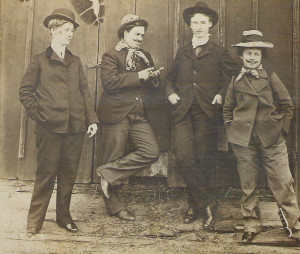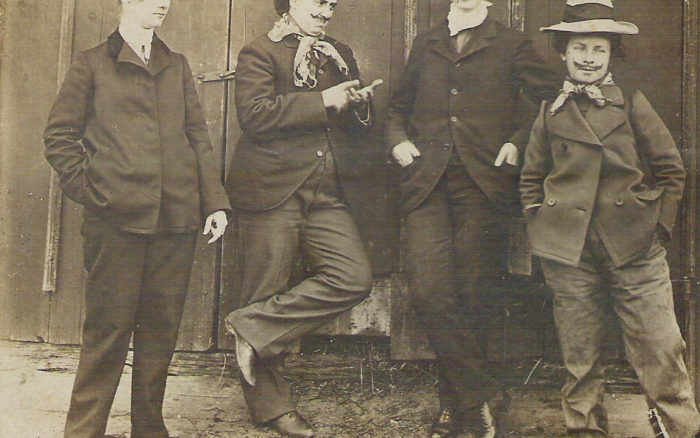 |
| Some of my storytelling relatives: My grandmother (second from the left) and her sisters, circa 1900’s |
Re-Storying the Psyche
My early training to be an analyst began by listening to my storytelling relatives. Besides the dinner table at noon (communal meals being an important part of communal work), stories were told during Sunday afternoon visiting. In the boredom of “nothing to do,” I would crawl behind the couch at my grandmother’s where I could uninhibitedly watch and listen to my relatives gossip. (My mother said staring was rude, and I thought my observations would go unnoticed!) One aunt’s false teeth continually slipped as she told of a neighbor’s daughter’s mishap or of the sausage making last week, making a popping noise. As I watched her expressions, I strained to hear the words behind the words, studying her tiny, red high heels and the floral dresses she always wore, trying to understand her complexities. (I felt she never liked me, finding me a pest!)
I loved hearing the stories my grandmother told over and over. She told me that when she was a girl, prairie chickens, now non existent in that area, were so numerous that they blackened the sky and that when they courted, they did a dance while making booming noise. She told of how, as a boy, Uncle Lloyd captured a skunk and put it into a barrel with a hole. When his brother Wayne begged to see what was in the barrel, he relented, and the skunk sprayed Uncle Wayne in the eye. How Uncle Wayne cried, Mama! Mama! Mama! How both of these trickster uncles, along with our family doctor, also a boy at the time, locked the teacher in the belfry at school.
For a long time I wondered if I enjoyed my patients’ stories too much. Maybe I was not being analytical enough. Some are very good storytellers! I love to settle in for a good story of what happened this week, and how it felt, and what happened next. But people don’t come to entertain me, or if they do, it is a therapeutic issue!
Then I heard that Dr. Joe Henderson (one of the founders of the C. G. Jung Institute in San Francisco and an analysand of Jung) loved hearing patients’ stories as well: what they did at the bus stop and on the ride to work. And I remember those few consultations I had with him in which he quietly and receptively sat before me, his attention, a warm bath, as I told my own stories about a series of dreams, or my latest episode in our training program. What gifts he bestowed through his listening!
If, as David Abram asserts, “re-storying” is part of restoration of our environment, part of learning to listen again to the inanimate and the animate world (1), is it also a part of healing the psyche? Storytelling brings engagement with inner and outer figures, a playfulness that allows for creative developments, for an expansion of consciousness that includes a larger perspective.
